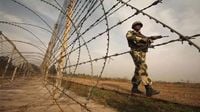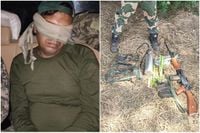Tensions between India and Pakistan have escalated following a recent incident involving a Border Security Force (BSF) jawan who accidentally crossed into Pakistani territory. The jawan, identified as Constable P.K. Singh of the 182nd Battalion, was apprehended by Pakistani Rangers after he mistakenly crossed the international border from the Firozpur sector in Punjab on April 23, 2025.
According to reports from various news agencies, the incident occurred in the afternoon while P.K. Singh was on duty near a field close to the border. He was accompanying farmers who were harvesting wheat in a designated area beyond the barbed wire fence, which is referred to as no man's land. Farmers in this area are permitted to cultivate their land with special permits, and BSF personnel, known as 'Kisan Guards', are deployed to ensure their safety during crop sowing and harvesting.
On that fateful day, Singh, feeling the heat, moved ahead to rest in the shade of a tree, which unbeknownst to him was located across the zero line in Pakistani territory. A Pakistani farmer spotted him and alerted the Pakistani Rangers, who subsequently detained Singh and confiscated his service rifle.
Officials from both sides confirmed that discussions are ongoing to secure the BSF jawan's release. A flag meeting between Indian and Pakistani forces is currently in progress to address the situation. An official noted, "Such incidents are not uncommon and have occurred before between the two sides." However, the backdrop of this incident is particularly sensitive given the recent terrorist attack in Pahalgam, Jammu and Kashmir, which has heightened tensions between the two nations.
Following the Pahalgam attack, which resulted in the tragic deaths of 26 tourists, India has taken a series of stringent measures against Pakistan, accusing it of sponsoring terrorism. In response to these developments, the Pakistani government convened a National Security Committee meeting on April 24, 2025, where it announced the termination of trade relations with India and the closure of its airspace to Indian aircraft.
The situation has been further complicated by India's decision to suspend the Indus Water Treaty (IWT), a critical agreement governing water sharing between the two countries. Pakistani officials have vehemently opposed this move, labeling it as an act of war and announcing plans to raise the issue at international forums, including the World Bank.
As the flag meeting continues, there is a palpable sense of urgency surrounding the BSF jawan's return. Sources have indicated that while discussions are ongoing, Singh has yet to be released. Efforts are being made to navigate this delicate situation through established military protocols, which typically involve procedural flag meetings following such incidents.
In the meantime, the Pakistani media has released images of the detained jawan, showing him in uniform with his eyes covered, alongside his AK-47 rifle and a water bottle. These images underscore the fact that Singh was on duty when he inadvertently crossed the border.
As the situation unfolds, both governments face the challenge of managing public sentiment amidst rising tensions. The Indian government has been under pressure from its citizens to take a strong stance against Pakistan, especially following the Pahalgam attack, which has spurred widespread anger and calls for action.
In light of these developments, it remains to be seen how both nations will navigate the complexities of their bilateral relations. The return of Constable P.K. Singh is not only a matter of military protocol but also a reflection of the fragile state of peace between India and Pakistan.
As officials from both sides work to resolve the situation, the incident serves as a reminder of the delicate balance that exists along the India-Pakistan border, where accidental crossings can lead to significant diplomatic ramifications. With both countries on high alert, the hope is that dialogue will prevail and that Singh will be safely returned to India.






